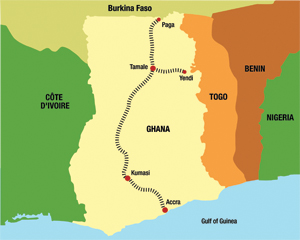Humanitarian groups, led by Amnesty International, are protesting Ghana’s planned eviction of hundreds of thousands of slum dwellers occupying land along a 24-kilometer section of a planned, nearly $7-billion, 1,224-km railway line.

The protests are further delaying the China-backed initiative, initially slated to commence this past April.
“We urge the Government of Ghana to suspend the eviction of people from their homes until the mandatory legal protections and safeguards are in place and an enumeration of affected communities has been completed; and durable solutions sought to ensure the right to adequate housing of all people along the railway is respected,” read a statement from Amnesty International. “Although we appreciate the authorities’ intention to redevelop the railway system and the benefits it will accrue to the people of Ghana, this must be done in a manner which respects human rights and should not leave people homeless.”
The project is being financed through a $10.4-billion, 20-year concessionary loan from China’s Export/Import Bank for infrastructure development, according to Ghana’s transport minister, Mike Hammah.
Ghana plans to demolish numerous residential and commercial structures along the pathway of the 24-km Accra-Tema line expansion. A $990-million contract for this section was awarded this past February to China’s General Machinery Import & Export Co. Ltd., a subsidiary of China National Machinery & Equipment Corp. This contract was originally slated for completion by the end of 2012.
According to a statement from Ghana Railways Development Authority, the country’s state-railway operator, the Accra-Tema project involves “construction of two culverts at Baatsona, rehabilitation of railway tracks, installation of signal and telecommunication systems, rehabilitation of 24 coaches and refurbishment of stations.”
At least 950 km of existing rail line will be converted from 1067-mm narrow gauge to standard gauge of 1435 mm. The upgraded track will boost axle-load limits to 25 tons from the current 16 tons, and allow increased speeds of 160 km per hour, up from the current 56 km per hour, according to the operator’s board chairman Daniel Markin.
Markin says a contract covering a 1,200-kilometer section linking Nsawam—near the capital of Accra—with Paga, near Ghana’s border with neighboring Burkina Faso, should still go forward next September. That project, valued at $6 billion and scheduled for completion by 2019, will upgrade approximately 600 km of the existing Nsawam-Kumasi line and also provide for construction of a new 500-km line linking Kumasi to Paga. Another 100-km line will be constructed to link Tamale to Yendi.

Post a comment to this article
Report Abusive Comment